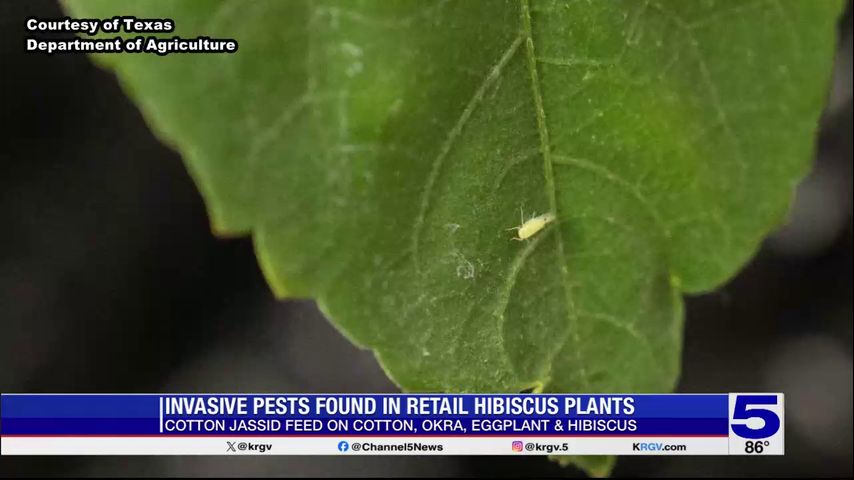The Texas Department of Agriculture announced on Tuesday they’re working to remove hibiscus plants from retail stores after invasive pests were found shipped into the state from Florida.
According to a news release, the cotton jassid — also known as the two-spotted leafhopper — was detected in August in multiple locations including College Station, McAllen, Weslaco, Harlingen, Victoria, Cedar Park, Waco, El Paso, and Longview.
“The cotton jassid is an invasive pest that feeds on a wide range of host plants, including cotton, okra, eggplant, sunflower, hibiscus, and several weeds,” the news release stated. “Heavy infestations cause leaf curling, yellowing, and plant decline, leading to major economic losses if left unchecked.”
News of the pest has Valley growers worried. Mendoza’s nursery in Harlingen said hibiscus plants are their top seller.
The cotton jassid was found on hibiscus plants in large retail chain stores like Home Depot and Lowe’s that we’re linked to a Florida nursery.
The Department of Agriculture is working with Texas A&M AgriLife Extension to help find the pest.
“Hopefully it won’t get established, but there’s great concern for the area down here —the lower Rio Grande Valley — just because of the conditions,” Texas A&M AgriLife Extension Integrated Pest Management Specialist Danielle Sekula said.
According to Sekula, the pest grows in our hot and humid weather conditions. She said she recently detected the two spotted leafhopper in McAllen, Weslaco and Harlingen.
Sekula said the small pest with two spots on their wings has the power to destroy crops and leave them looking burnt.
“You notice the damage first before you see the pest,” Sekula said. “Obviously you saw how small this pest so you don’t even notice that you have it. We might have a lot of hibiscus plants that are just gonna up and die and a lot of people will think, ‘well, maybe I didn’t water it enough.'”
The 2025 cotton harvesting season just wrapped up in the Valley, but growers are worried the pest could affect next year’s crop.
Sekula recommends anyone who might have recently bought a hibiscus, and it ends up dying to throw it away in the trash.
If infestation is suspected, contact the Texas Department of Agriculture at 1-800-835-5832.
Watch the video above for the full story.
